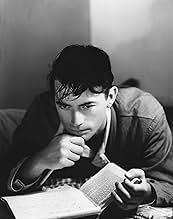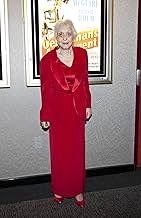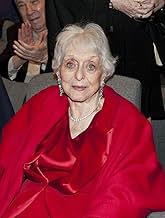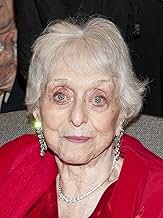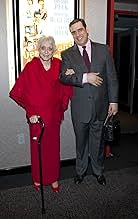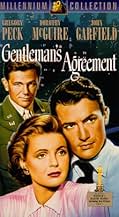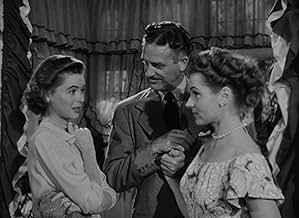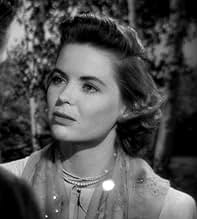A reporter pretends to be Jewish in order to cover a story on anti-Semitism, and personally discovers the true depths of bigotry and hatred.A reporter pretends to be Jewish in order to cover a story on anti-Semitism, and personally discovers the true depths of bigotry and hatred.A reporter pretends to be Jewish in order to cover a story on anti-Semitism, and personally discovers the true depths of bigotry and hatred.
- Director
- Writers
- Stars
- Won 3 Oscars
- 17 wins & 9 nominations total
- Bill Payson
- (as Ransom M. Sherman)
- Waiter
- (uncredited)
- Nightclub Patron
- (uncredited)
- Mother
- (uncredited)
- Director
- Writers
- All cast & crew
- Production, box office & more at IMDbPro
Featured reviews
During the course of the film names like Gerald L.K. Smith, Theodore G. Bilbo, and John E. Rankin are mentioned. The first was a Protestant evangelical minister who started out with Huey Long, but then developed a line of anti-Semitism in his sermons. He had a considerably large following back in the day though the Holocaust did a lot in killing his recruiting. Theodore G. Bilbo and John E. Rankin were a couple of Mississippi politicians who for their redneck constituency successfully linked anti-Semitism and racism. They didn't like foreign born either and used a whole lot of ethnic slurs.
But the anti-Semitism that Gregory Peck takes on is not that of Bilbo, Smith, and Rankin. It's the genteel country club anti-Semitism that manifests itself in restricted resorts, quotas as to how many Jews will some white shoe law firm accept if any, discrimination in hiring practices, unspoken covenants {gentlemen's agreements} not to sell to Jews in certain areas; all these we see in Gentlemen's Agreement.
Peck is given an assignment to write about it and he hits on a novel approach. Just being hired by publisher Albert Dekker, he gets Dekker's backing when he says he will pretend he's Jewish and see how he's being treated. He gets quite an experience in the bargain.
Running parallel to Peck's masquerade is his courtship of Dorothy McGuire. She's a divorcée, he's a widower with a young son. The whole thing puts a strain on their relationship, especially in dealing with her sister, Jane Wyatt who lives in one of those restricted by Gentlemen's Agreement communities.
Gentlemen's Agreement came up with several nominations and three Oscars for Best Picture, Best Director to Elia Kazan, and Best Supporting Actress to Celeste Holm as a tart tongued fashion writer at Peck's magazine who proves to be a friend. Peck himself was nominated for Best Actor, but lost to Ronald Colman for A Double Life. Holm also beat out Anne Revere nominated for the same film, probably helped by the fact that Revere had won a few years earlier for National Velvet.
John Garfield who was Jewish took a small supporting role in the film as Peck's long time childhood friend who educates Peck into how a Jew deals with the rebuffs he's finding out about. Had he not been up also for Body and Soul as Best Actor, he might well have earned a Supporting Actor nomination here.
Also note Sam Jaffe as the fictional professor Lieberman which is a thinly veiled caricature of Albert Einstein probably the most noted figure in the world of Jewish background. Like Lieberman, Einstein's a cultural Jew, not religious in any sense of the word. Nevertheless he was a leading figure at the time in the Zionist movement, having endured all that Peck endured in Germany and seeing what was coming with Hitler, fled his native Germany for safe harbor in the USA.
My favorite character in the film however has always been June Havoc as Peck's secretary. She changed her name to something ethnically neutral to get her job in the very magazine that will now crusade against anti-Semitism. She's also become a self hater, a phenomenon that other discriminated people also experience. GLBT activists are fully aware of what self hate has done, not hardly unknown among other groups as Ms. Havoc demonstrates.
Of course Gentlemen's Agreement is dated with its topical references to post World War II trends and events. Yet it still has a powerful message to deliver. It made Gregory Peck one of the great liberal icons of Hollywood and still should be seen by all as a great lesson in the pitfalls of unreasoning hate.
However, this movie has lessons that every new generation should learn.
The lessons taught in this movie can be applied to other forms of prejudices such as sexism, racism, and homophobia among others.
Our society today is still full of "nice" people who detest bigotry and intolerance, but stand idly by while it happens right in from of them. Watching this movie could change all that.
An interesting and rabid attractive drama in which a reporter pretends to be a Jewish in order to cover a story on anti-Semitism , only to find the masquerade entailing a backlash of grief and pressure for himself and his own family . Archetypical Hollywood social comment and the 20th Century Fox studio's fondness for realism looks remarkable dated in places . However , relying heavily for complicated loving relationships , tension and on a handful of attractive dramatic pieces and offering an important analysis of the problem . This sentimental and muddled film was Hollywood's first major attack on anti-Semitism. A successful movie that received 8 Oscar nominations and three wins, including Kazan's first for Best Director. Gregory Peck gives a terrific acting in an upright role similar to Atticus Finch , he is a journalist who has to deal with both overt and covert prejudice . John Garfield has a small but essential role as Phil's Jewish friend Dave . Starring Gregory Peck and Dorothy McGuire are accompanied by a very good support cast , such as : Celeste Holm , Anne Revere , June Havoc , Albert Dekker , Jane Wyatt , Dean Stockwell and Sam Jaffe.
The film was compellingly made by Elia Kazan who did not get along with actor Gregory Peck ; as usual Kazan dealing with thoughful and provoking issues . In fact , his films were concerned with personal or social issues of special concern to him. Kazan writes, "I don't move unless I have some empathy with the basic theme." And this first such "issue" film was Gentleman's agreement (1947). It was followed by Pinky (1949), one of the first films in mainstream Hollywood to address racial prejudice against black people. A streetcar named Desire (1951), an adaptation of the stage play which he had also directed, received 12 Oscar nominations, winning four, and was Marlon Brando's breakthrough role. In 1954, he directed On the waterfront (1954), a film about union corruption on the New York harbor waterfront. In 1955, he directed John Steinbeck's East of Eden (1955), which introduced James Dean to movie audiences. Rating : 6.5/10 .Notable . Controversial in its day , yet still timely .
Released the same year and touching on the same subject was Edward Dmytryk's Crossfire, which dealt with anti-Semitism at its extremes: murder with anti-Semitism as the motive. Gentleman's Agreement takes a more humanistic and subtle approach--one that is too subtle at times. Where Crossfire dropped the bomb of anti-Semitism into the laps of the audience, Gentleman's Agreement gives it to you in periodic shots in the arm in the form of a sermon, and each one says the exact same thing: anti-Semitism is bad. (But we knew that.) Yes, the message is an important one, but feeding it to the audience in a manner that is literally shoving it down our throats every few minutes doesn't help the digestion any.
Also lacking in Gentleman's Agreement is a three-dimensional protagonist. Peck's crusading writer who masquerades as a Jew is simply too zealous and unswerving for his own good. He has no faults, no inner conflicts and no doubts about himself. Whether he's being shunned by bigots or Dorothy McGuire, he's such a straight-shooter you know what he's going to do before he does: the right thing right away.
There's no real dramatic arc in the story, with the entire weight of the movie resting on the torrid on-again-off-again love affair between Peck and McGuire. She symbolizes the hypocrisy and passiveness of the everyday American on anti-Semitism, and he points it out to her every chance he gets-and that's all. It pretty much rambles on the same dramatic level all throughout the picture, dividing its time between love scenes and sermons, most of which are indistinguishable from one another.
In the end, the important message and the overall entertainment value of the picture suffers from this redundancy.
Oscars Best Picture Winners, Ranked
Oscars Best Picture Winners, Ranked
Did you know
- TriviaIn 1984 Gregory Peck claimed to have been misquoted in a 1967 interview in which he said Elia Kazan was the wrong director for the film. The actor said, "That's a misunderstanding. I don't think there could have been a better director for the film. What I meant was that he and I didn't have a rapport; emotionally, we were not on the same wave length. I don't think that I did my best work for him. If I worked with him now--as a mature man--I think I would give him everything he would want."
- GoofsEarly on, when Phil reminisces about his Jewish friend, Dave, he looks into the mirror and assesses his own features as being consistent with those of the Jews. This reveals his own experiences of having been influenced by the false stereotype of there being a "Jewish look". This is antithetical to his attacking anti-Semitic thoughts and actions in others, throughout the film. This, however, should not be considered a "GOOF" as many people are guilty of hypocrisy.
- Quotes
Kathy Lacey: You think I'm an anti-Semite.
Phil Green: No, I don't. But I've come to see lots of nice people who hate it and deplore it and protest their own innocence, then help it along and wonder why it grows. People who would never beat up a Jew. People who think anti-Semitism is far away in some dark place with low-class morons. That's the biggest discovery I've made. The good people. The nice people.
- Crazy creditsThe main title theme begins with the Fox logo, replacing the usual Alfred Newman fanfare.
- ConnectionsFeatured in Precious Images (1986)
- How long is Gentleman's Agreement?Powered by Alexa
Details
Box office
- Budget
- $1,985,000 (estimated)
- Runtime1 hour 58 minutes
- Color
- Aspect ratio
- 1.37 : 1


